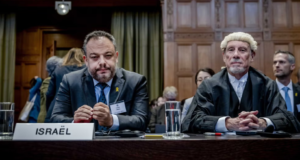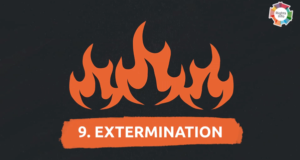Palestinian women sit in a bedroom in Beit Lahiya, Gaza where Israeli soldiers shot into a home. (AFP/Thomas Coex)
From Mona Elfarra, a Palestinian physician and women’s rights activist living in the Jabalia refuge camp in the Gaza Strip.
Friday, June 30, 2006
The power is still off. It comes on and off irregularly. The electricity company is trying hard to supply power to 1.5 million people who used to get electricity from the power plant that was completely destroyed two nights ago.
Tonight another electrical generator was attacked and destroyed completely. I tried to explain to my daughter the complicated mechanisms of power distribution and how the electrical company is trying hard. But she was so frustrated to learn that we will be receiving patchy power for another three months at least.
They are attacking Gaza City right now, Jabalia and Beit Lahia. The emergency room at Al Awda Hospital received seven casualties. They launched at least 15 missiles, and the noise of the jet fighters and Apache helicopters interrupted my already interrupted sleep. I am fully awake now. I have not gotten good sleep for four days.
Saturday, July 1, 2006
My friend Hoda lives next to the Ministry of Interior building in Gaza, which was hit last night with two rockets. The attack occurred at 2 a.m. yesterday. (Please forgive me about the accuracy – I am starting to lose track of days and nights, and how many times we were attacked). Hoda told me that her whole building was shaking. She went out in her pajamas, and all the residents were out in their nightwear; children’s faces were too pale, some of them were crying hysterically. The fumes filled the place. I live 150 meters [about 164 yards] from Hoda’s place. Nobody is safe, no one is immune.
The power is still off. We had it for three hours yesterday, enough to recharge my laptop and mobile phone and to do some cooking. I am highly concerned about the hospitals; the fuel supply to run the local generators is running down. The medication and medical supplies are running down too. Water is scarce too. We need to ration our water use. We are going through a big humanitarian disaster.
Sonic booming happens when the jet fighters go quickly through the sound barrier. We experience this sort of terrifying raid at least seven times during the day and night. How can I let you know my personal feelings during these raids? If I am sleeping, my bed shakes tremendously; my daughter jumps into my bed, shivering with fear and then both of us end up on the floor. My heart beats very fast. I have to pacify my daughter; now she knows we need to pacify each other. She feels my fear. If I am awake, I flinch and scream loudly; I cannot help myself. OK, I am a doctor and a mature middle-aged woman with a lot of experience, and an activist too, but with this booming I become hysterical – after all we are all humans and each have our own threshold.
Monday, July 3, 2006
We in Gaza face great pressure. For those who need to be reminded, since the start of this intifada (in September 2000), Gaza’s economy has been severely affected by the continuous Israeli atrocities: roadblocks, border closures, destruction of agricultural areas and home demolitions. The current rate of unemployment more than 50%. The vast majority of Palestinian families are living on humanitarian aid, and an increasing number of families live under the poverty line. Gaza is just 360 square kilometers [about 139 square miles] with nearly 1.5 million residents, so we have a very high population density.
After four months of economic sanctions, we in the health field face a collapsing health system. We do not have medications in our stores and have had to prioritize surgical operations due to lack of medical supplies. The last thing we needed is the power cut off.
Wednesday, July 5, 2006 – 1:45 a.m
Big explosion, very big and so loud; I’m fully awake, and so is Sondos, my daughter. We hardly can see anything. It is very dark. The drone hit the Ministry of Interior building again with a missile. That completely destroyed the building, according to the news from the radio.
I contacted Hoda, who lives next to the building, and found her hysterically screaming and shouting in pain, trapped under her broken windows, all the windows of her flat broken, the fumes filling the place. She is waiting for the emergency team to evacuate her.
I can hear the hysterical sounds of her neighbors over the phone. I feel helpless and don’t know what to do. Five of her neighbors were injured, some of them the terrified kids I mentioned in one of my previous blogs.
When I visited Hoda four hours ago, we both were tense. A third friend asked us to talk about anything but not politics or what is going on in the Palestinian scene. We tried to but couldn’t. I left her, walked home.
I have no analysis. Maybe you can try to help me to know why they would hit an empty building twice. I see it as desperation, eagerness to revenge themselves.
It is not because of the soldier. They dropped thousands of shells on Gaza, killing women, children and old people, even before he was captured. Fatah and Hamas signed a national agreement. There could have been negotiations.
But Israel would have to give up control of our land, our resources. They want to destroy our government. They want to destroy our will to get our rights, to live a normal life in our land.
Wednesday, July 5, 2006 – 3 a.m
It is dark. Sondos is asleep. I cannot go to bed. I have no batteries for my transistor. I do not know where Hoda is. My mobile needs to be recharged. I have no power; I am restless, anxious and helpless. My laptop is gasping too.
Thursday, July 6, 2006 – 8:13 p.m
It seems that the Israeli military operation is escalating. 1:30 p.m. our local time, casualties started to reach the Al Awda hospital (Jabalia refugee camp). The hospital medical team received 13 civilians seriously injured and 2 dead militia men. The hospital’s 3 operating rooms worked with its full capacity, for continuous 5 hours. I was told by Mr. Abusaada, one of our ambulance drivers, that they evacuated the injured under heavy fire. Mr. Abusaada, told that they were working under fire, I always think of him and others and how they work under the most difficult circumstances, the worse, he faced when he evacuated the Galia family from the beach 3 weeks ago.
Today he told me he was not allowed to reach one of the injured who bled on the ground for at least half an hour (when one minute can make a difference for bleeding case ), before passing away. Other hospitals received 15 injured civilians as well, different ages, no children, were hurt in this incident. I hope I will not give news about dead or injured children. 18 Palestinians were killed today in Gaza strip tens were injured, mainly in the north of Gaza.
My main concern now is to find a way to get medications and medical supplies through the borders, into Gaza. The hospital medical resources are exhausted, the borders are completely sealed, some very crucial medications are lacking.
The Rafah borders in the south, was opened today for 3 hours. There are at least 2,000 Palestinians on the Egyptian side, waiting to enter Gaza. They have been waiting since last Sunday. When the “summer rain” operation started, internationals were asked to leave Gaza, via Eretz checkpoint, that was opened for 2 hours only (for us here in Gaza this is alarming sign). Karni checkpoint, the commercial checkpoint, was opened to let in some stuff for 4 hours, maybe to let in more candles, transistors and torches.
It seems that this business is booming in Gaza those days. On my way back from the hospital, I could see people queuing to purchase candles.
Saturday, July 8, 2006 – 1:00 a.m
The Gaza hospitals medical resources is critically decreasing , the number of causalities increases as the operation continues, in 2 days 34 Palestinian were killed, of the many injured 33 were children. The city’s 3 hospitals are working round the hour they urged people to donate blood. I told you earlier on that the civilians are not avoided, it is a battle that lacks the balance of power; with the resistance men and their comparatively limited weapons, and the most powerful army in the region, with the full support of the USA.
I was at Al Awda hospital this morning. The staff enjoys good spirit, but they are exhausted. They complained of their worries regarding the shortage of the fuel that runs the electrical generators. It has to be used for the ambulances too. It was quiet in the morning, casualties started to arrive in the late afternoon. I shall be there tomorrow.
I hate war, it is ugly so is the occupation.
Saturday, July 8, 2006 – 12:40 a.m
I did not tell you before about my mother. She lives in Khan Yunis, 22 km to the south of Gaza City. I was born and brought up there, until I was 16, when I left to university in Egypt. My mother is 84, she is living alone after the death of my father, and she is physically disabled. She is well looked after. I visit her whenever I have time, and this happens twice weekly at least, my elder sister lives next door and since the start of the “summer rain” operation, by the occupying Israeli forces, I couldn’t reach her.
I was overwhelmed with the situation, besides the 2 bridges that connect Gaza in the north and Khan Yunis in the south, were destroyed in the 1st few hours of the military assault, as well as the power plant. I was afraid to use the unreliable side roads. I was not ready to risk by leaving Sondos alone, with all the consequences, air raids, sonic booming, no power, complete road block, and staying away of my daughter and my work.
 International Solidarity Movement Nonviolence. Justice. Freedom.
International Solidarity Movement Nonviolence. Justice. Freedom.



